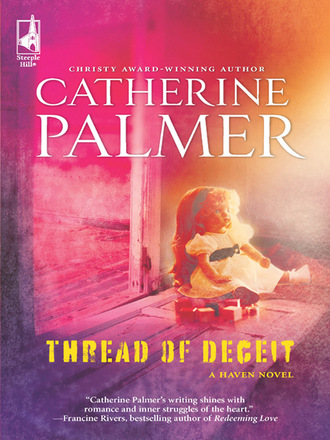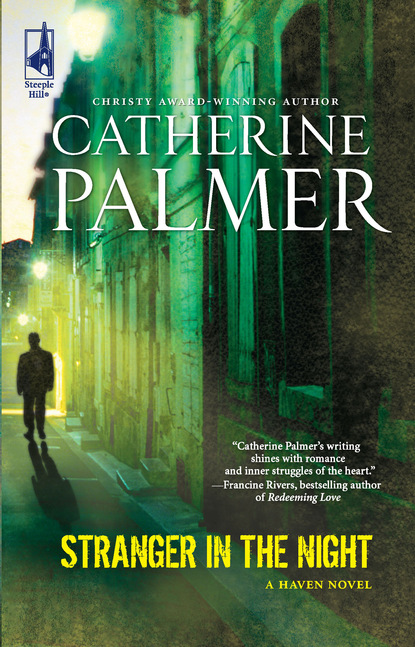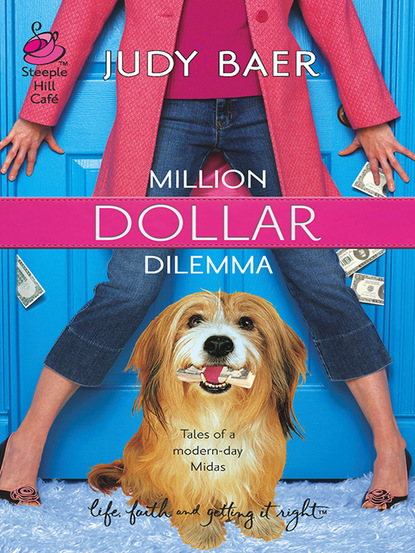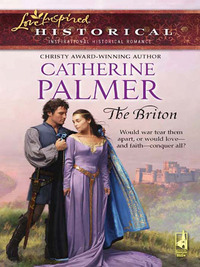
Полная версия
Thread Of Deceit
“Later, Raydell,” Sam said as the teen sauntered away. He glanced at his watch. Almost time for activity change. He would send Miss Burns packing as soon as he could hand over these kids to someone else. She had stepped into the office, and he could see her talking to Caleb. One hand on her hip, she leaned over and said something to the boy.
That’s right, Cleopatra. Try to work your wiles on a seventeen-year-old boy. It won’t get you what you want.
A moment later the office door opened and Caleb walked out. But instead of coming for Sam, he headed toward the row of small rooms where the younger children were doing crafts projects and listening to stories. The young man poked his head into one room after another. Finally, he headed up the stairs.
So that was her scheme. She knew she couldn’t get anything out of Sam, so she had set her sights on his Haven partner. Young Caleb had been sent off to fetch Terell Roberts while she sharpened her claws. Smooth move, Cleopatra, but—
“Uncle Sam, I think the basketball is flat, sir.” Tenisha tugged on the hem of his T-shirt. “It don’t bounce good, and Gerald keeps on stealin’ it away from me.”
He studied the orange basketball as players maneuvered it around on the makeshift court. “It’s still got air, Tenisha.”
“I can’t do it, Uncle Sam.” Her face crumpled as she clenched her fists. “I told you! I can’t play basketball. I can’t run.”
“Hey, now—what’s this I can’t nonsense? Is that how we talk at Haven?”
“No, sir, but I really can’t. My legs don’t work good ’cause of the palsy, and every time somebody throws me the ball, Gerald pushes me out of the way and takes it.”
Sam focused on the skinny boy with buckteeth that stuck out so far he had a permanent groove on his bottom lip. Gerald carried a massive chip on his shoulder because he’d been bullied for years about his appearance. The kid had learned that Tenisha made a handy target when he felt the urge to take his frustrations out on someone.
“Stealing the ball is part of the game, Tenisha,” Sam told her gently. “But pushing is illegal. Tell you what, next time Gerald pushes you, fall down flat and start wailing.”
“You mean crying?”
“Just let out a squawk loud enough to get the referee’s attention. Who’s ref today?” He glanced at the court. “Okay, see Patrick over there with the whistle? If you fall down and squawk, he’ll notice what’s going on and call it. Before too long, Gerald will foul out of the game.”
“Ain’t that cheatin’?”
“Not if he really pushes you. The pros do it all the time.” He paused as his line of vision centered on Miss Cleopatra Burns, notebook out and pen in hyperdrive, having a big confab with Terell.
“Hey, T-Rex!” he hollered. Then he patted the girl on the back. “Go on out there, Tenisha. Don’t let Gerald mess with you.”
Before the codirector of Haven could spill the beans about their problems with the health department, Sam hoofed it over to him. “Terell, this is the reporter I told you about, and we don’t—”
“Anamaria Burns,” she cut in, turning to him and sticking out her hand. “How are you this afternoon, Mr. Hawke?”
“Not happy to find you back here.” He took her thin, strong hand and gave it a hard squeeze. “I told you we don’t have anything to say about paint.”
“That’s what I’ve been trying to tell her,” Terell spoke up. “This lady doesn’t listen, man.”
Sam regarded his best friend. Terell was the color of rich, dark coffee, but otherwise he looked like Sam’s twin. However, while Sam was the keeper of rules and the master of the clock, Terell functioned as Haven’s mascot. A teddy bear.
Today, as usual, a child hugged him, small arms wrapped around the man’s large leg as if clinging to a tree trunk. He held a little girl with blond hair on his back, her cheek resting on his head and her arms around his thick neck. She was asleep.
“Terell and I discussed this the other day,” Sam told the reporter. “We don’t think it’s a good idea to talk to you.”
“She won’t take no for an answer,” Terell said. “She keeps on saying she’ll write about the good we’re doing here.”
“She’s going to make a big deal about the paint.”
“I can write the article any way I want,” the reporter interjected.
“I’ve been burned by the press before,” Terell added. “But I don’t know, Sam. Maybe she could help us.”
“Does my opinion carry any weight around here?” Sam shot back.
“Not as much as you like to think, dog,” Terell replied. As he spoke, his face split into a grin, and his distinctive deep laugh rolled up out of his chest. He guffawed for a moment, the little boy who clung to his leg joining in with a giggle.
Sam turned on Cleopatra. “Is that the focus of your story, Miss Burns? The good things we do at Haven?”
“Well, no, but—”
“That’s what I thought. You’re going to write about our building, and how we don’t meet city code and the health department is breathing down our necks.”
“How long do you have to fix the paint problem?” she asked.
“Two weeks,” Terell said.
Sam rolled his eyes. “Way to spill the beans, T-Rex.”
“Two weeks is not long.” She scribbled on her notepad. “Are you planning to raise funds, or do you have an account set up for emergencies?”
“An account!” Terell started laughing again. “Did you see any of these kids pay to get in here? None of our donors are handing over enough money to set aside extra, ma’am. We pulled together the start-up money from what was left after my NBA days with the Magic, and now we’re basically what you’d call a charity case.”
“You played professional basketball, Mr. Roberts?” she asked, writing fast.
Sam eyed his friend in dismay. “You’re going to give her enough for a book, aren’t you, Terell? Sure, tell her everything.”
“No way, man. Not about DFS and all that.”
“Division of Family Services?” Ana spoke up. “They have a problem with Haven, too?”
“I can hardly wait to read the article,” Sam growled.
“Well, why don’t you handle it then?” Terell glanced at his gold Rolex watch, one of the few remaining luxuries from his once-lucrative career. “It’s time for activity change, anyhow. I’ll take care of it, and you talk to Miss Burns.”
“I don’t want to talk to her. I want her to leave.”
“Listen, Mr. Hawke,” she said. “I already have enough information here to include Haven in my article, so you might as well fill in a few holes. I can always talk to DFS myself.”
Sam stared at Terell. Terell stared back. Ever since their basketball days at Louisiana State University, the two had butted heads. Sam was intense, driven, edgy. Terell loved everyone, saw the silver lining in each situation and would give away his last dime. Sam had practiced on the basketball court for hours, honing his skills, pushing himself to his limits. Terell arrived late to practice, barely passed his college classes and led the team to one victory after another on raw talent. Sam trusted no one. Terell believed the best about everyone he met. So-called friends had conned, manipulated and cheated him out of most of his money, yet he never held a grudge. The two men loved each other like brothers.
“I’ll talk to her,” Sam said finally. “You’ve got five minutes, Miss Burns.”
“Ana.” She smiled, radiant and suddenly prettier than he’d realized.
“Shall we go to my office?” he asked. “It’s quieter.”
“Your office?” The smile vanished. “We can talk here. I don’t have a problem with noise.”
He studied her for a moment, observing the brown eyes and reading in them something he hadn’t expected. Fear. So, Miss Ana Burns had a chink in her armor. She didn’t want to go into his office. His turf. Seeing an advantage, he seized it.
“I’d like to sit down,” Sam told her. “Been on my feet all day, you know. Follow me.”
“But…” she tried. “But I…”
Ana matched his stride as Sam headed across the room. Unusually long legs, he noted. Most women barely reached his shoulder, but a tilt of this one’s head would put her face disconcertingly close to his.
Military training had taught Sam the art of inspection, and instinct took over despite his determination to ignore the pesky reporter. Her firm chin and aquiline nose created a sharp profile, he noted, which was softened by large brown eyes and full lips. Squared shoulders eased into gentle curves. Her topknot had clearly started the morning tightly coiled. But the day had loosened it, and now wisps of dark hair trailed around her ears and down the back of her long neck. The combination of prickly and soft intrigued Sam—which in turn, irritated him no end.
A short distance away, Terell blew the whistle for activity change. Like jelly beans, kids poured out of the little classrooms, down the stairs and across the basketball court. Despite his annoyance at her intrusion, Sam felt glad that the reporter was seeing the large numbers of children and teenagers who had found a secure place to spend their summer days.
Without Haven, most would be loitering on the streets, vulnerable to the drug dealers, drive-by shootings, prostitution and gang activity that proliferated in these neighborhoods. Here, they stood a much greater chance of not becoming a statistic—one of the hundreds of young men who ended up in hospital emergency rooms with knife or bullet wounds, or one of the countless unmarried teenage girls who became pregnant each year.
Giving them hope was Sam’s passion. His mission. He had blown assignments in the past. Made mistakes. Fatal flaws. This time he would not fail.
He stepped into the front office and clapped a hand on Caleb’s back. “How’s the computer, buddy?”
“A pile of junk.” Caleb squinted into the screen as he spoke his familiar refrain.
“Hey, get on the Internet and see if you can dig up a little dirt on somebody for me—her name’s Ana Burns.”
“There’s no modem on this old thing, sir, and I—” Caleb glanced up, saw the woman, and then laughed in embarrassment. “Oh, hey there, Miss Burns.”
“Hello, Caleb.”
“I thought you wanted to talk to Terell.”
“I intended to, but it looks like I’m stuck with Uncle Sam.”
The teen grinned. “Lucky you.”
“By the way,” she addressed Sam as they walked down a short hallway to his personal office. “My name is Anamaria Cecilia Guadalupe Burns, and you won’t dig up any dirt on me. I’m clean. Your dog can vouch for that.”
“Your name…you’re Hispanic?” he asked, pulling the door shut behind him and pointing her to a chair.
She stood statuelike, eyeing the room, her knuckles white on the handle of her purse. Then, moving suddenly, she turned and jerked open the door. With two quick paces, she stepped to the chair and sat, her hips on its edge as though she intended to leap up at any moment.
“I prefer the term Latina, ” she said, flipping open her reporter’s notebook. “My mother was born and raised in Mexico. My father’s ancestors came from Scotland. I grew up in Brownsville, Texas, graduated from UTB with a degree in English and worked at the Brownsville Herald before moving here five months ago.”
“Ah,” he said, taking a seat behind his desk.
“And you?”
“Wyoming.”
“What brought you to St. Louis?”
“Haven.” He straightened a stack of papers, tamping the edges before setting them back on his desk. “I thought this interview was about lead paint.”
“And I thought you wanted a broader story.”
“You don’t need my background for that. Write about the kids. Most live in government-subsidized housing projects. Few have a father in the home. We have a mix of African-American and Caucasian, but we—”
“So I’ve observed.” Her eyebrows lifted like a pair of raven’s wings. “Sorry to interrupt, but would you mind if I asked the questions?”
Sam leaned back in his chair and laced his fingers across his stomach. The lady was a major pain.
“I like your office, by the way,” she said, brown eyes flashing from one side of the small room to the other. Long dark lashes curled up almost to her eyebrows. “Orderly. Neat. But you ought to clean the front area. That pile of wet towels is sprouting mold.”
“Would you like to take over management of our laundry room, Miss Burns?”
“It’s Ana, and the posters are peeling off the walls out there, too. That office is a wreck.”
“We have lead paint in our laundry room,” he informed her. “I can’t let the kids work there anymore, because the paint is peeling even worse than those posters out front. So our towel mass is becoming critical, and we could use an adult to help out.”
“I’m not that into laundry,” she said. “I send most of my clothing to a dry cleaner.”
He sat back and studied her. “Ah. A dry cleaner type.”
“Do you have a problem with dry cleaners?”
“I have a problem with people taking up my valuable time discussing wet towels.”
She picked up her notebook. “When did you meet Terell Roberts?”
“At LSU. We both played basketball there.”
“And then you turned pro?”
“He did. Played for the Magic and the Clippers. I went into the military. Marines.”
“Ah,” she said. “A Marine type.”
He couldn’t hold back a grin. “Not a Marine type. A Marine. I brought that training to Haven, because I believed if I could teach discipline and respect, the kids would benefit.”
“So you contributed the military atmosphere, while Terell came up with the seed money to start the operation.”
“Haven is a team effort. We rely on our patrons for funding. Our volunteers add their ideas to make this a better place. Nobody has all the answers to help these kids.”
“So what’s your motivation?”
“Like I said. Helping kids.”
“Really?” She sounded skeptical. “Terell wants to help children, too, I suppose.”
“Yes, he does.”
“Why these kids? And why you?”
He put his head on the padded chair back and closed his eyes. How could he explain the complex and painful reasons why he had sought out Terell Roberts after so many years? How could anyone even begin to understand what had compelled him to spend every last cent he had saved, to work countless hours tearing out old plaster and making the place habitable, to come each morning knowing it might be the last day Haven’s doors would open?
Lifting his head, he gazed at Ana Burns. She sat across from him, her notebook propped up and her pen poised. Her straight shoulders and long neck were held in that regal pose now so familiar to him. But for the first time, he noted a small pendant at her throat. A gold cross set with garnets.
“Your necklace,” he said.
Her hand moved up to touch the cross. “My mother gave it to me on my fifteenth birthday—the Quinceañero. It’s a special occasion.”
“It’s a reminder of your family…and your faith?”
“God is important to me.” Her dark eyes pinned him. “Without Him, I wouldn’t exist.”
Stunned at her bluntness, Sam couldn’t respond for a moment. She dropped her focus to her notebook, as if reading over what she had written, but he could see that her eyes weren’t moving.
He let out a breath. “Then maybe you’ll understand this. I started Haven because I believed it was what God wanted me to do.”
She had stopped taking notes and was moving her pen tip around on the paper in a tiny blue circle. “You believe God talked to you?”
“In a way.”
“Is it the same with Terell?”
“Terell is a strong Christian. When we were in college together, he led me to Christ.”
She looked up. “Led you to Christ?”
“To salvation. I’d been raised in a Christian home and had believed in Jesus from early childhood. Terell helped me see that it’s not enough to believe. A person has to commit his life to Christ.”
She wrote something in her notebook. “So, your patrons…you run Haven as a religious organization?”
“We get some financial support from churches, and we maintain Christian principles. But Haven is nondenominational. We’re not-for-profit, and we operate under those governmental regulations. We don’t qualify for any exemptions as a religious group.”
“You’ve met state guidelines in every area except this lead paint situation?”
“As far as I know. They allowed us to go ahead and open, but different agencies keep coming around to inspect. We’re doing our best.”
He stood, the subject touching a sore place in his gut. “The codes, the regulations…the whole thing is difficult. When Terell and I found this building and bought it, we thought we’d just need to clean it and then get the center going. We had big plans for the outside—turning the parking lot into a top-notch basketball court with bleachers and a snack bar, setting up a tennis court, even putting sod down for a park area with picnic tables. But we haven’t had time to start on any of that because of all the work we’ve had to do inside—wiring, plumbing, rehabbing the whole basic structure. We had to widen doorways and enlarge the bathrooms. Had to buy special toilets. Had to put in ramps. Lights. Exit signs. Washer and dryer.”
He moved across the room and began restacking the books on his small shelf. “Don’t get me started on the kitchen,” he continued. “We’re not even close to code there. We’re not certified, so we can’t provide hot meals or homemade refreshments—which was one way we hoped to make a little money. At this point, all we can sell is packaged snacks, popcorn and sodas, and we do that at cost.”
“I had no idea it was so complicated,” she murmured, taking notes. “It sounds like an uphill battle.”
“Battle is the right word for it. Right after we purchased the building, vandals broke into the main level. It was still empty, so they couldn’t find anything to steal. But they smashed out windows, spray-painted walls, demolished toilets. We’ve had to use the bathrooms downstairs, which is a problem for our kids with special needs. Some of our volunteers have offered to build ramps, and those have to meet code. We’ve been working like crazy to fix the restrooms on this level, and we’re nearly there. The punks destroyed nearly all our light fixtures, too, so now we’re working to buy and install new ones.”
“Your military background must be a help. If you see this as a battle, I’m sure you’re determined to win.”
“We’ll win. But there are times I’d almost rather be stranded in an Iraqi sandstorm.” He rubbed the back of his neck, remembering. “Terell and I can handle the kids, and our volunteers will get the building into shape. But we need more of two things we lack. Time and money.”
“If Terell played professional basketball, he must have earned a huge salary.” She frowned, the raven wings drawing closer. “Maybe you could convince the city to give you more time.”
“Terell can tell you about his pro career, if he chooses, but he gave Haven all he had left. He’s a good man. We’re both willing to sacrifice everything for this place, but we can’t live forever without bringing in some income. And we can’t keep the doors open unless we have a solid financial operating base. The trouble is that our donors are reluctant to fork over more money until they’re sure we’re on solid footing with the city, the county, the state and probably the Feds.”
“Makes perfect sense.” She leaned back, relaxing in her chair for the first time since she’d entered his office. “And it explains your reluctance to let me publicize your problems.”
As the light of understanding shone in her eyes for the first time, the knots in Sam’s shoulders loosened a little. He picked up a file from his desk.
“Our donors are mostly individuals or small-business owners,” he explained. “Churches have given us some money, but we don’t have any corporate sponsors. We can’t afford to pay salaries for a fund-raiser and a public relations expert. Basically, it’s up to Terell and me to carve out the time for those things.”
“Doesn’t sound like it’s your cup of tea.”
“We’re both athletes. I’m a soldier.” He dropped the file on his desk. “Nah, it’s not our thing.”
“Mind if I take a look at your donor list?”
“Why?”
“I’d like to take down the names and give some of them a call. If I can get a few good quotes about the vision these people have for Haven, my article might help you drum up additional support.”
He considered her request. “If our donors agree to be interviewed, it’s fine with me. But I don’t want you to publish names without their permission.”
“No problem.” She took the file he handed to her and scanned the list. “This is good. I know some of these people. Isn’t Richard Hayes the CEO of a moving van company?”
“He’s been great. But so far, it’s all been personal donations. He hasn’t involved his business yet, and that’s where the big money is.”
“These are fairly large churches, aren’t they?” she asked, jotting information as she went down the list.
“Sure, but they’re in low-income areas. They send us a lot of volunteer help, but they don’t have much money to give.”
Her finger stopped at a name. “I know this man—Jim Slater. He goes to my church.” She looked up, her face transformed by that radiant smile. “He runs an adoption agency, doesn’t he?”
“It’s called Young Blessings Adoption Services,” he told her. “Jim’s on our board of directors, and he drops by fairly often to help out with the kids. I’m assuming he must be well-off, because he’s done a lot for Haven. He paid for new tile in the bathroom. In fact, I have an appointment with him later this afternoon. To talk about the lead paint problem.”
“I bet he’ll help. I’ve worked with Jim in the church nursery a couple of times. He’s a gentle man, and so good with children. He lost his wife to cancer, you know.”
“I didn’t realize that.”
“Well, this is great.” She looked up from her notebook. “One more thing, Sam. Terell mentioned a problem with DFS.”
Sam shook his head. “Your story’s on lead paint, Miss Burns. That’s all I’m willing to discuss.”
“But why would Family Services be after you?”
“They’re not ‘after’ us. You make it sound like we’re criminals.”
“Are you?”
He scowled. “Of course not. If you work with children and don’t meet your health codes, then DFS starts sniffing. Look, I’ve given you all the time I can, Miss Burns.”
“Ana.” She stood. “So, how’s the little girl in the corner?”
He thought for a moment, picturing the forlorn child who never spoke. “We’ve tried, but we can’t get her involved in our activities. Still, she seems to feel safe with us. She comes every day.”
“She’s kind of a lost child, isn’t she?”
“Invisible. That’s the word I use. She’s not the only one. We have several kids who drift at the fringes, looking on, and trying not to be noticed. They’re like ghosts. Haunting. We do our best to involve them, but we don’t insist that they join the activities.”
He started for the door. “Why don’t you talk to the girl? And put in a load of laundry while you’re at it.”
He was halfway down the hall before he realized he’d left her alone in his office. An unsupervised guest. A snoopy reporter. He swung around, strode back into the room and took her arm.
“This way out, Miss Burns.”
“Ana.”
“Cleopatra,” he muttered, leading her through the front office. He gave her a nudge out into the main area, where the youngsters were playing basketball. “There she is—in her corner. See if you can get through to her. Even a name would be helpful.”
“I don’t have time.”
“Sure you do.” He studied Ana, surprised at the pale wariness that filtered across her face. “We’re not helping her. Maybe you can.”
“I can’t, sorry. I have to make these phone calls.”
“Scared?” he asked, taking a step closer, meeting her almost face-to-face. “You’re happy to announce Haven’s problems in your article, but when it comes to understanding what we really do, what our mission means—”
“I’m not scared,” she snapped back. “I’m just not comfortable with children.”
“You work in your church nursery.”
“One-on-one, I mean.” Her eyes narrowed and her soft lips pursed. “Okay, Uncle Sam. I’ll go talk to her. I’ll talk to the other kids, too. Maybe I’ll find out a few of your secrets.”








